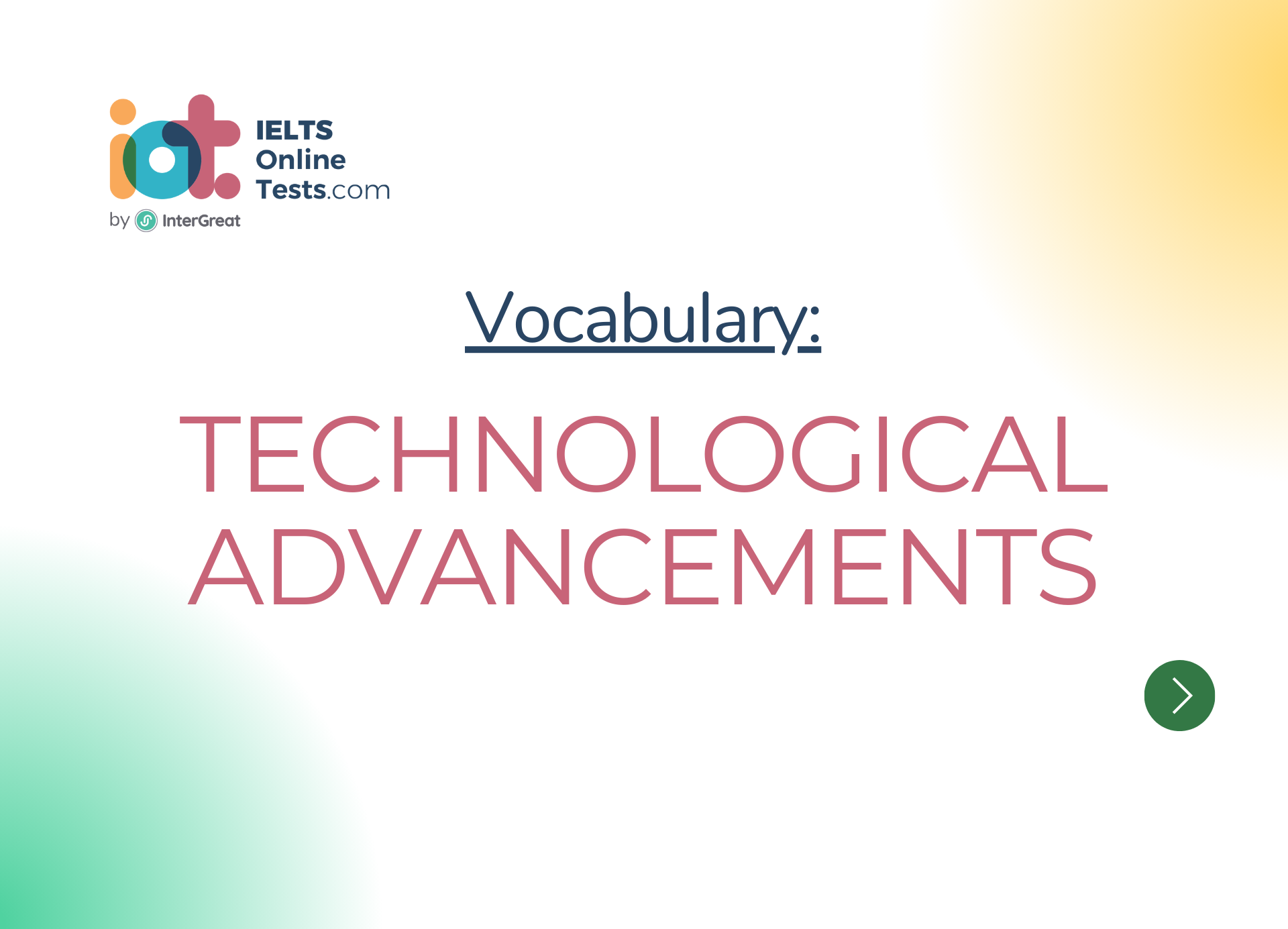
Technological advancements
Here are some vocabulary words related to technological advancements for the IELTS band score range of 4.5-6.0:
Innovation
The introduction of new ideas, methods, or technologies to improve or revolutionize existing systems.
Automation
The use of technology to perform tasks or processes with minimal human intervention.
Artificial Intelligence (AI)
The simulation of human intelligence in machines, enabling them to perform tasks that typically require human intelligence, such as speech recognition and problem-solving.
Internet of Things (IoT)
The network of physical objects embedded with sensors, software, and other technologies that enable them to connect and exchange data with other devices and systems.
Virtual Reality (VR)
A computer-generated simulation or immersive experience that can be similar to or different from the real world.
Augmented Reality (AR)
A technology that superimposes computer-generated images or information onto the user's view of the real world.
Cloud Computing
The delivery of computing services, such as storage, servers, databases, networking, and software, over the internet.
Big Data
Extremely large and complex datasets that require advanced technologies and methods for processing and analysis.
Cybersecurity
Measures and practices taken to protect computer systems and networks from unauthorized access or attacks.
Biotechnology
The use of biological systems, organisms, or derivatives to develop or create products and technologies.
Renewable Energy
Energy derived from natural resources that are constantly replenished, such as solar, wind, and hydroelectric power.
Digitalization
The conversion of analog information into digital format, making it easier to store, access, and manipulate.
Blockchain
A decentralized and distributed digital ledger used to record transactions across multiple computers securely.
Machine Learning
A subset of artificial intelligence that allows systems to learn and improve from experience without being explicitly programmed.
Quantum Computing
A type of computing that uses quantum-mechanical phenomena, such as superposition and entanglement, to perform operations on data.
3D Printing
A manufacturing process that creates three-dimensional objects by adding material layer by layer.
Biometrics
The measurement and analysis of unique physical or behavioral characteristics for identification and authentication.
E-commerce
The buying and selling of goods and services over the internet.
Cyber-Physical Systems
Integrated systems that bridge the gap between physical elements and computer-based control and monitoring.
Drones
Unmanned aerial vehicles used for various purposes, including surveillance, delivery, and data collection.
Internet Privacy
The protection of personal information and data on the internet.
Smart Cities
Urban areas that use digital technologies and data to enhance efficiency and improve the quality of life for residents.
Telemedicine
The remote delivery of healthcare services using telecommunications technology.
Robotics
The design, construction, and operation of robots to perform tasks autonomously or semi-autonomously.
Machine Vision
The ability of a computer to interpret and understand visual information from the environment.
Internet Security
Measures taken to protect internet-connected systems, networks, and data from cyber threats.
Data Mining
The process of discovering patterns, correlations, or useful information from large datasets.
Internet of Things (IoT) Devices
Physical objects or devices with embedded sensors and internet connectivity that can collect and exchange data.
Cloud Storage
Online data storage services that allow users to store and access data over the internet.
Genetic Engineering
The manipulation of an organism's genetic material to produce desired traits or outcomes.
Green Technology
Environmentally friendly technologies designed to reduce the impact on the environment.
Autonomous Vehicles
Self-driving or driverless vehicles that can navigate and operate without human intervention.
Nanotechnology
The study and manipulation of matter on an atomic and molecular scale.
Smart Homes
Homes equipped with automation systems that can be controlled remotely through smart devices.
Virtual Assistant
An artificial intelligence-powered application or device that can perform tasks and answer questions for users.
Renewable Energy Sources
Energy sources that can be replenished naturally, such as solar, wind, geothermal, and hydroelectric power.
Wireless Technology
Communication technology that allows data transfer without the use of physical wires or cables.
Biometric Authentication
Using unique physical or behavioral characteristics, such as fingerprints or facial recognition, for user identification.
Digital Currency
Electronic or virtual currency that uses cryptography for secure financial transactions.
Machine Translation
The use of computer algorithms to translate text or speech from one language to another.
Green Energy
Energy generated from renewable and environmentally friendly sources.
Internet Connectivity
The ability of devices to connect to the internet through various means such as Wi-Fi or cellular networks.
E-waste
Discarded electronic devices and equipment, which can be harmful to the environment if not properly recycled.
Biological Computing
The use of biological molecules or systems to perform computational tasks.
Data Privacy
The protection and management of personal information and data to ensure confidentiality and security.
Digital Marketing
Advertising and promotion of products or services through digital channels such as social media and online platforms.
Cyber Defense
Strategies and technologies used to protect computer systems and networks from cyber threats.
Wireless Charging
Charging electronic devices without the need for physical cables by using electromagnetic fields.
Educational Technology
The use of technology in education to enhance learning and teaching experiences.
Cyber Warfare
The use of digital attacks to disrupt or damage computer systems and networks.
Remember to familiarize yourself with these terms and their usage in context to enhance your comprehension and communication skills. Technological advancements play a significant role in modern society, and understanding these concepts will be beneficial for your academic and everyday life. Good luck with your language learning journey!




